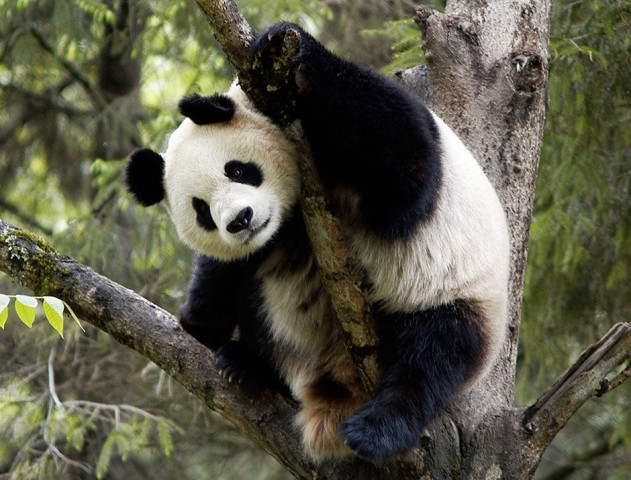Giant pandas are no longer on the 'endangered' list
Efforts by China, which claims the giant panda as its national animal, have brought its numbers back from the brink

PHOTO: WWF
Decades of conservation work has paid off as the giant panda has been downgraded from the status of ‘endangered’ to ‘vulnerable’ on the global list of species at risk of extinction, demonstrating how an integrated approach can help save our planet’s vanishing biodiversity.
Survey finds giant pandas no longer 'endangered' in China
The positive change to the giant panda's official status was announced by The International Union for Conservation of Nature (IUCN). Its population saw a 17 per cent increase in the decade up to 2014, when a nationwide census found 1,864 giant pandas in the wild in China; up from 1,596 in 2004.
 PHOTO: WWF
PHOTO: WWF PHOTO: WWF
PHOTO: WWF PHOTO: WWF
PHOTO: WWFThe good news was welcomed by environmentalists and animal rights activists. “For over fifty years, the giant panda has been the globe’s most beloved conservation icon as well as the symbol of WWF. Knowing that the panda is now a step further from extinction is an exciting moment for everyone committed to conserving the world’s wildlife and their habitats,” Marco Lambertini, WWF Director General said in a statement.
 PHOTO: WWF
PHOTO: WWF PHOTO: WWF
PHOTO: WWF PHOTO: WWF
PHOTO: WWFThe giant panda was once widespread throughout Southern China and is revered in Chinese culture. Intensive, high-profile campaigns have focused on the panda since the 1970s to save the species from its precarious position.
7 magnificent pictures of endangered snow leopards in Pakistan
Several initiatives have been in place to save the giant pandas and their habitat, including helping to establish an integrated network of giant panda reserves and wildlife corridors to connect isolated panda populations as well as working with local communities to develop sustainable livelihoods and minimise their impact on the forests.
 PHOTO: WWF
PHOTO: WWF PHOTO: WWF
PHOTO: WWF PHOTO: WWF
PHOTO: WWFAll efforts and initiatives have paid off as the number of panda reserves have jumped to 67 which now protect nearly two-thirds of all wild pandas. According to WWF, efforts have also helped to safeguard large swathes of mountainous bamboo forests, which shelter countless other species and provide natural services to vast numbers of people, including tens of millions who live alongside rivers downstream of panda habitat.
World's largest gorillas 'one step from going extinct'
The change in its classification points to the decades of successful efforts led by the Chinese government and demonstrates how investing in conservation of such species does pay off, which in turn benefits our society and other species.
 PHOTO: WWF
PHOTO: WWF PHOTO: WWF
PHOTO: WWF PHOTO: WWF
PHOTO: WWF“Everyone should celebrate this achievement but pandas remain scattered and vulnerable, and much of their habitat is threatened by poorly-planned infrastructure projects – and remember: there are still only 1,864 left in the wild," Lo Sze Ping, CEO WWF-China said.
After decades of work, it is clear that only a broad approach will be able to secure the long term survival of China’s giant pandas and their unique habitat, made even harder by climate change impacts. It will require even greater government investment, stronger partnerships with local communities and a wider understanding of the importance for people of conserving wildlife and the landscapes in which they live
 PHOTO: WWF
PHOTO: WWF PHOTO: WWF
PHOTO: WWF PHOTO: WWF
PHOTO: WWFExperts however warn that the good news for pandas could be short-lived. A warming planet, driven by fossil fuel burning, is predicted to wipe out more than one-third of the panda’s bamboo habitat in the next 80 years.



















COMMENTS
Comments are moderated and generally will be posted if they are on-topic and not abusive.
For more information, please see our Comments FAQ